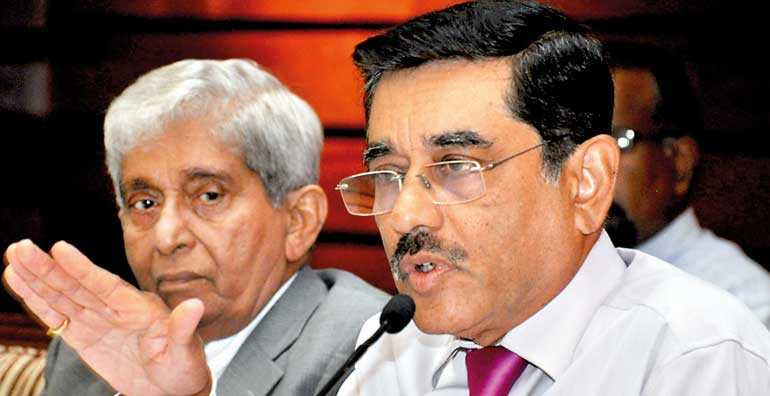Wednesday Jan 07, 2026
Wednesday Jan 07, 2026
Monday, 30 December 2019 02:06 - - {{hitsCtrl.values.hits}}

Central Bank Senior Deputy Governor Dr. Nandalal Weerasinghe (right) briefs the media along with Governor Dr. W.D. Lakshman – Pic by Lasantha Kumara
By Uditha Jayasinghe
Signaling an extraordinary change in sentiment, private sector credit growth gathered pace from August to November, accelerating by about 78% to exceed Rs. 149 billion with the last month alone seeing an expansion of Rs. 47 billion. In the months from January to August, credit only grew by Rs. 42.8 billion, according to latest data from the Central Bank.
The Central Bank said a steady expansion in credit disbursed to the private sector in absolute terms was observed during the four-month period commencing August 2019. Private sector credit, in absolute terms, recorded an increase of Rs. 47.1 billion in November following an increase of Rs. 26.2 billion in October.
Cumulative increase during the first 11 months of 2019 was Rs. 191.8 billion, cumulative increase from August to November was Rs. 149.3 billion. Year-on-year growth of credit to the private sector further moderated to 4.4% in November from 5.1% in October.
“Going forward, the growth of credit aggregates is expected to recover gradually, with the expected continued decline in lending rates and the proposed moratorium on bank loans,” the Bank added.
Driven by low credit expansion, year-on-year growth of broad money (M2b) also continued to moderate with M2b growth decelerated to 6.1% (y-o-y) in November from 6.7% in October.
Net Credit to Government (NCG) from the banking sector expanded by Rs. 185.3 billion during the first 11 months of 2019 compared to an increase of Rs. 348.2 billion in 2018.
Credit to State-owned enterprises (SOEs), on a cumulative basis, increased by Rs. 47.5 billion during this period, compared to an increase of Rs. 218.4 billion in 2018.
Given that market lending rates are set to decline further in 2020, Central Bank Senior Deputy Governor Dr. Nandalal Weerasinghe was optimistic that the moratorium extended to small and medium enterprises (SMEs) would have limited impact on balance sheets of banks. He also called on SMEs not to resort to the moratorium unless absolutely necessary as it would not reduce borrowing costs but only extend the repayment period.
“We looked at the impact on the bank balance sheets and we think exposure is minimum. It is the Central Bank’s role to ensure the safety of the banking sector. That is why (moratorium) was extended and it is expected to help revive the economy, provide ease to some businesses, so that economic activity can come back. Our monetary policy stance will bring down interest rates further. This is the balancing act. This is why we are in consultation with stakeholders,” Dr. Weerasinghe said.
“Our expectation is that SMEs who are doing well may not want this moratorium because this will only restructure and extend the loans by another 12 months. Moreover they will have to pay the interest, so it will not reduce the cost of borrowings. It is only giving some space to increase cash flows to people who are under stress,” he added.
Currently the Non-Performing Loan (NPL) ratio for commercial banks is 4.9% and 9.8% for finance companies as of October.
